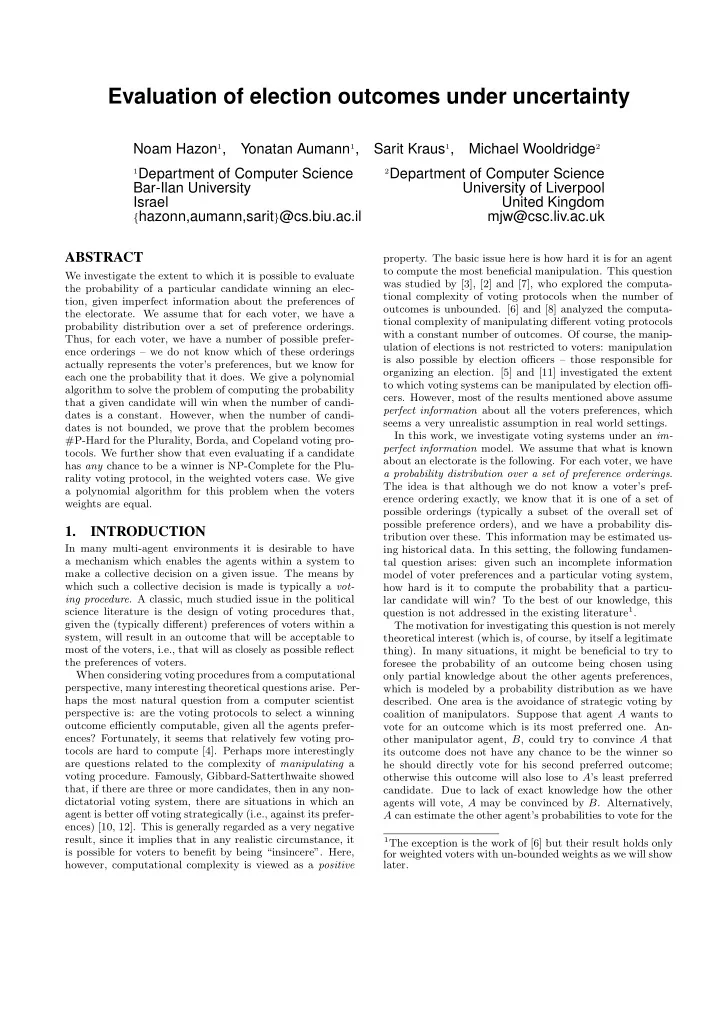

Evaluation of election outcomes under uncertainty Noam Hazon 1 , Yonatan Aumann 1 , Sarit Kraus 1 , Michael Wooldridge 2 1 Department of Computer Science 2 Department of Computer Science Bar-Ilan University University of Liverpool Israel United Kingdom { hazonn,aumann,sarit } @cs.biu.ac.il mjw@csc.liv.ac.uk ABSTRACT property. The basic issue here is how hard it is for an agent to compute the most beneficial manipulation. This question We investigate the extent to which it is possible to evaluate was studied by [3], [2] and [7], who explored the computa- the probability of a particular candidate winning an elec- tional complexity of voting protocols when the number of tion, given imperfect information about the preferences of outcomes is unbounded. [6] and [8] analyzed the computa- the electorate. We assume that for each voter, we have a tional complexity of manipulating different voting protocols probability distribution over a set of preference orderings. with a constant number of outcomes. Of course, the manip- Thus, for each voter, we have a number of possible prefer- ulation of elections is not restricted to voters: manipulation ence orderings – we do not know which of these orderings is also possible by election officers – those responsible for actually represents the voter’s preferences, but we know for organizing an election. [5] and [11] investigated the extent each one the probability that it does. We give a polynomial to which voting systems can be manipulated by election offi- algorithm to solve the problem of computing the probability cers. However, most of the results mentioned above assume that a given candidate will win when the number of candi- perfect information about all the voters preferences, which dates is a constant. However, when the number of candi- seems a very unrealistic assumption in real world settings. dates is not bounded, we prove that the problem becomes In this work, we investigate voting systems under an im- #P-Hard for the Plurality, Borda, and Copeland voting pro- perfect information model. We assume that what is known tocols. We further show that even evaluating if a candidate about an electorate is the following. For each voter, we have has any chance to be a winner is NP-Complete for the Plu- a probability distribution over a set of preference orderings . rality voting protocol, in the weighted voters case. We give The idea is that although we do not know a voter’s pref- a polynomial algorithm for this problem when the voters erence ordering exactly, we know that it is one of a set of weights are equal. possible orderings (typically a subset of the overall set of possible preference orders), and we have a probability dis- 1. INTRODUCTION tribution over these. This information may be estimated us- In many multi-agent environments it is desirable to have ing historical data. In this setting, the following fundamen- a mechanism which enables the agents within a system to tal question arises: given such an incomplete information make a collective decision on a given issue. The means by model of voter preferences and a particular voting system, which such a collective decision is made is typically a vot- how hard is it to compute the probability that a particu- ing procedure . A classic, much studied issue in the political lar candidate will win? To the best of our knowledge, this question is not addressed in the existing literature 1 . science literature is the design of voting procedures that, given the (typically different) preferences of voters within a The motivation for investigating this question is not merely system, will result in an outcome that will be acceptable to theoretical interest (which is, of course, by itself a legitimate most of the voters, i.e., that will as closely as possible reflect thing). In many situations, it might be beneficial to try to the preferences of voters. foresee the probability of an outcome being chosen using When considering voting procedures from a computational only partial knowledge about the other agents preferences, perspective, many interesting theoretical questions arise. Per- which is modeled by a probability distribution as we have haps the most natural question from a computer scientist described. One area is the avoidance of strategic voting by perspective is: are the voting protocols to select a winning coalition of manipulators. Suppose that agent A wants to outcome efficiently computable, given all the agents prefer- vote for an outcome which is its most preferred one. An- ences? Fortunately, it seems that relatively few voting pro- other manipulator agent, B , could try to convince A that tocols are hard to compute [4]. Perhaps more interestingly its outcome does not have any chance to be the winner so are questions related to the complexity of manipulating a he should directly vote for his second preferred outcome; voting procedure. Famously, Gibbard-Satterthwaite showed otherwise this outcome will also lose to A ’s least preferred that, if there are three or more candidates, then in any non- candidate. Due to lack of exact knowledge how the other dictatorial voting system, there are situations in which an agents will vote, A may be convinced by B . Alternatively, agent is better off voting strategically (i.e., against its prefer- A can estimate the other agent’s probabilities to vote for the ences) [10, 12]. This is generally regarded as a very negative result, since it implies that in any realistic circumstance, it 1 The exception is the work of [6] but their result holds only is possible for voters to benefit by being “insincere”. Here, for weighted voters with un-bounded weights as we will show however, computational complexity is viewed as a positive later.
Recommend
More recommend